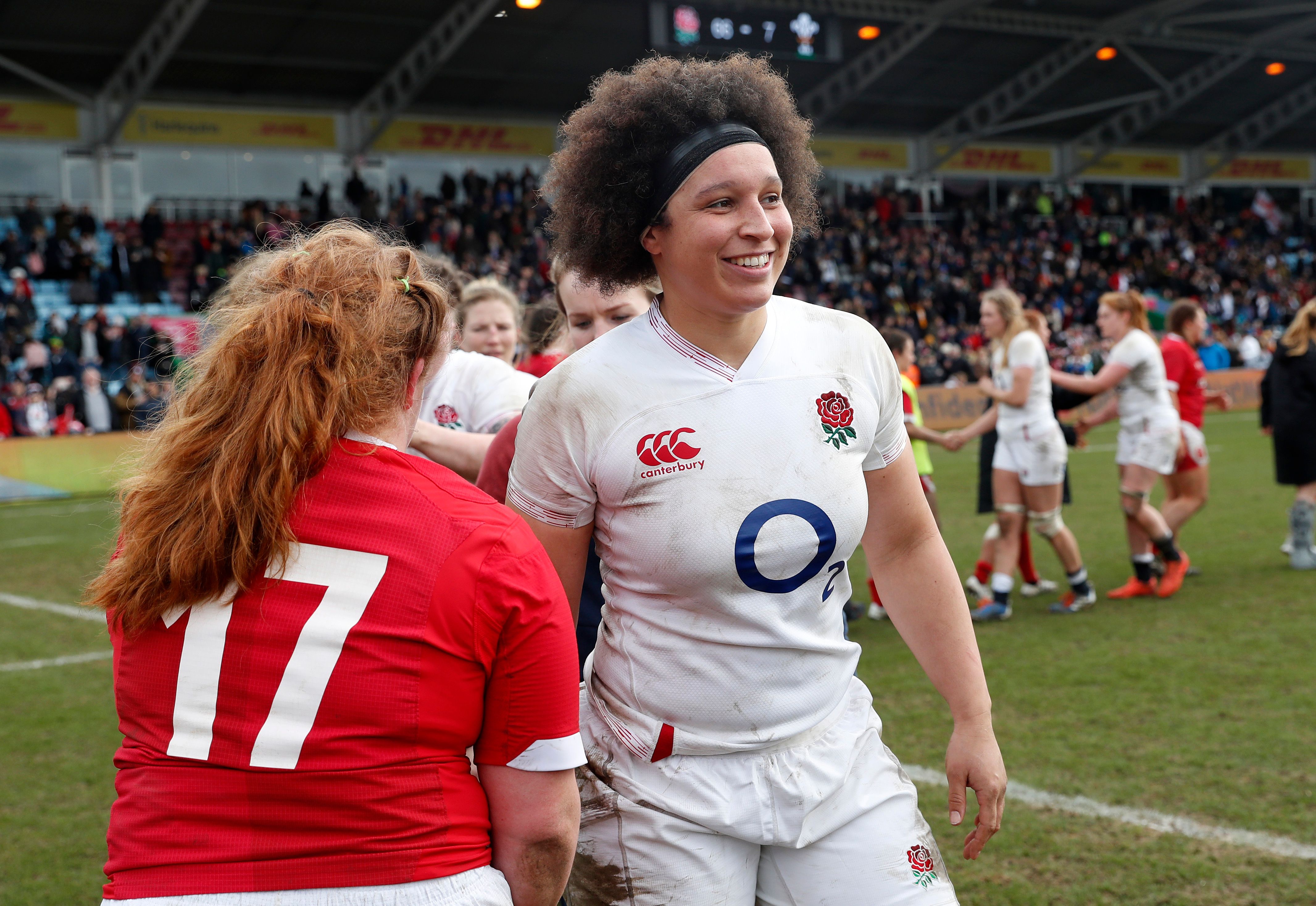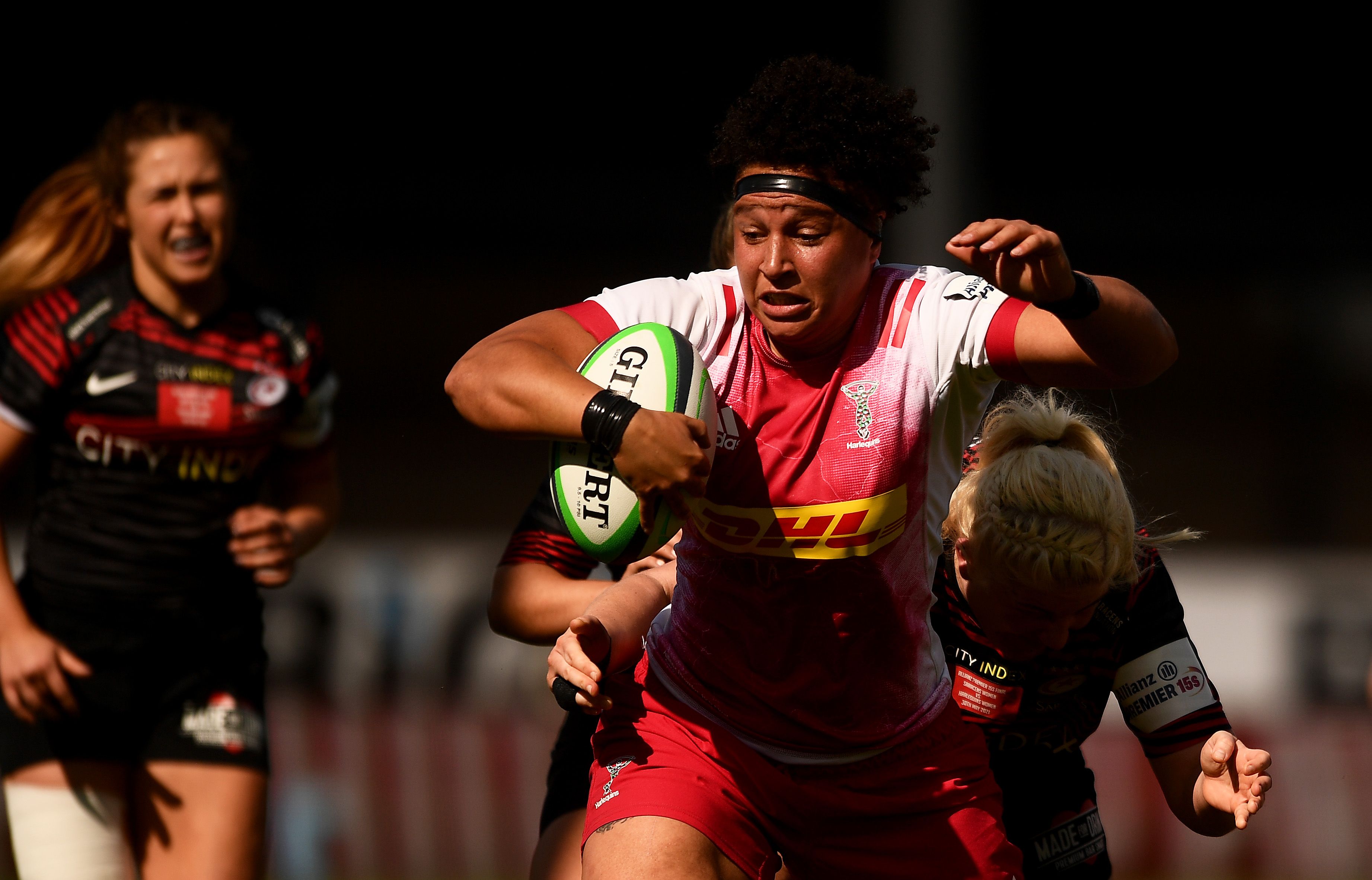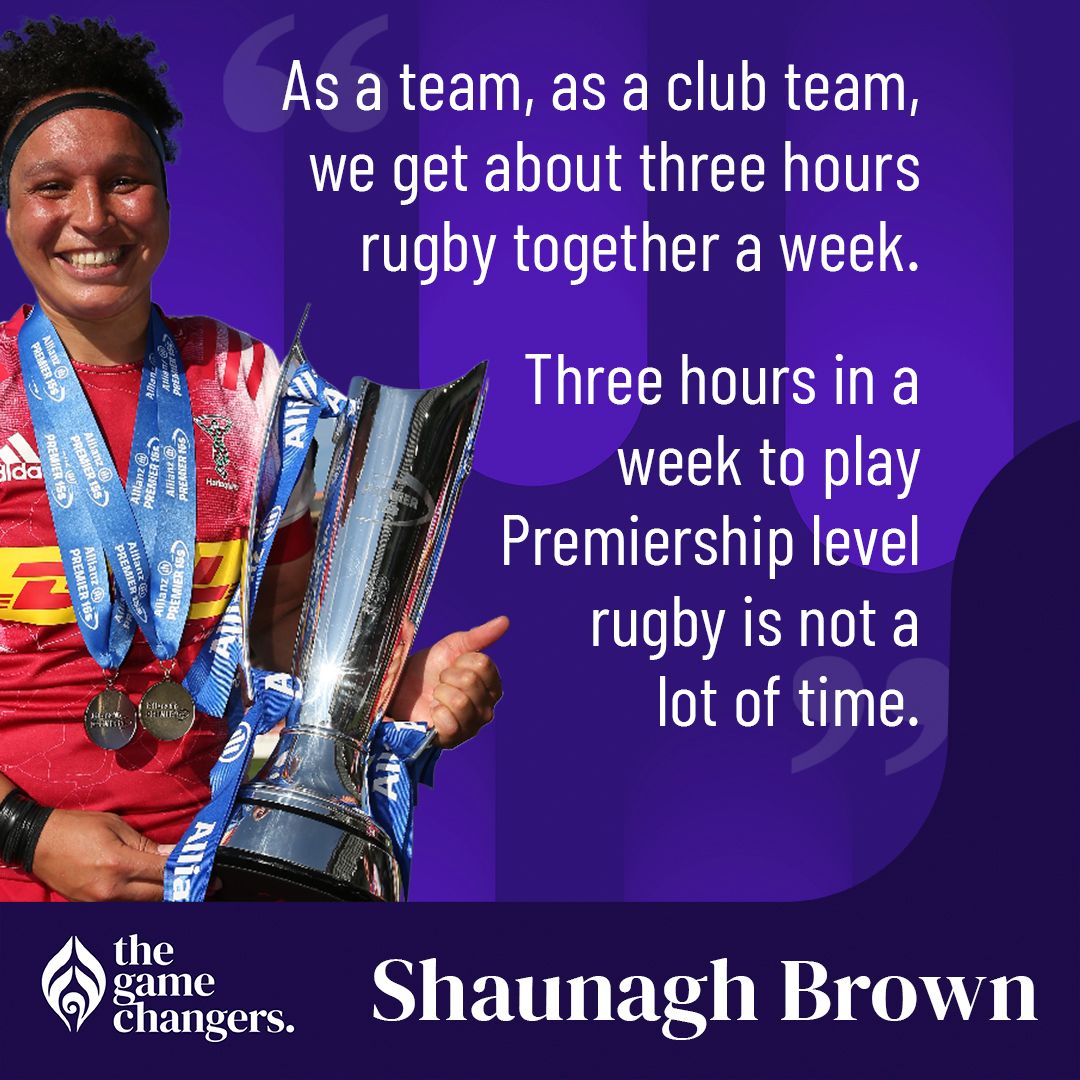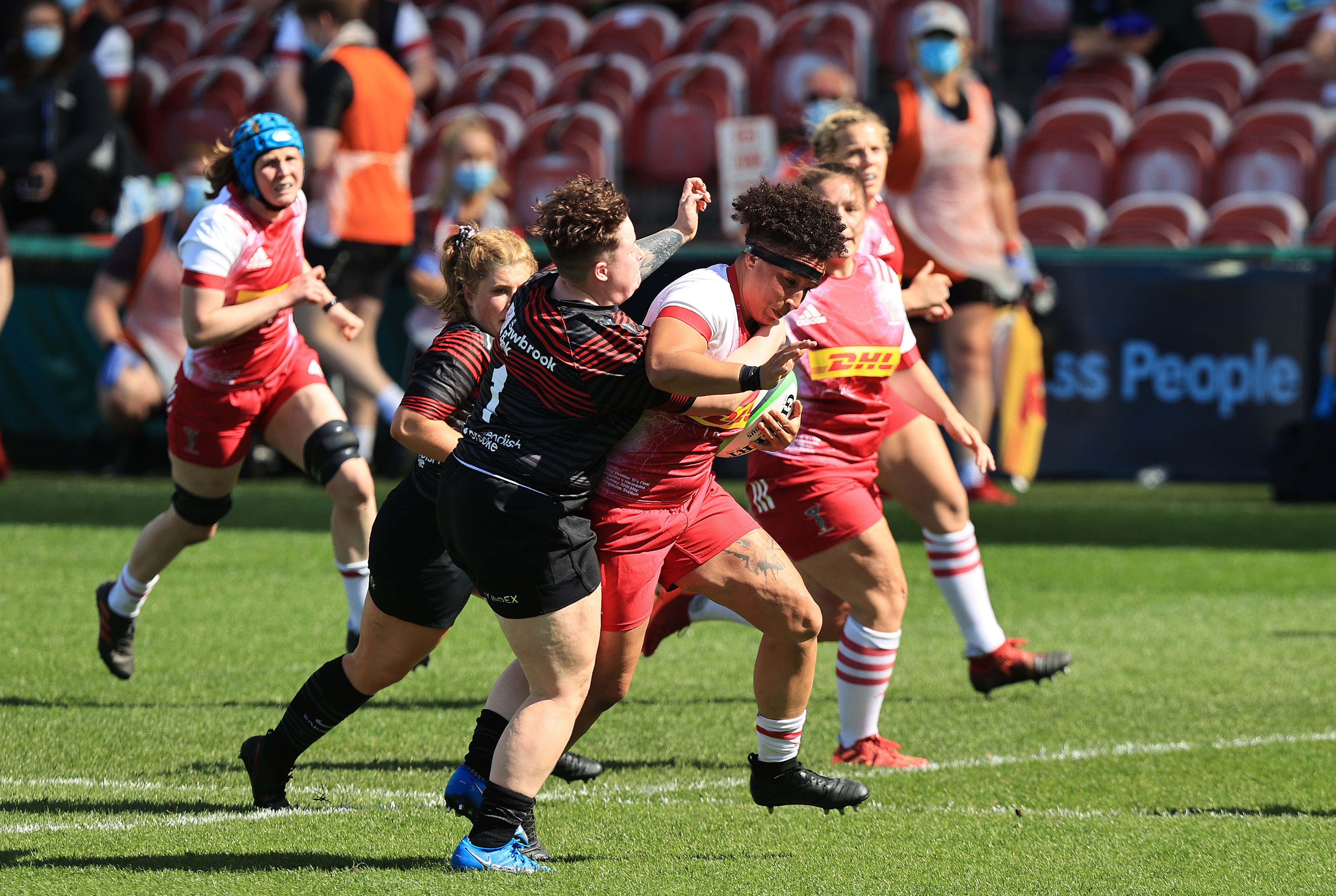English Rugby Union star Shaunagh Brown was the first guest on Series 10 of the Game Changers podcast.
Brown’s journey to the top of women’s rugby has been nothing short of remarkable. The 32-year-old only started playing the game at the age of 25 and made her international debut for England just two years later.
A multi-talented athlete, the Harlequins prop also represented England in athletics and competed at the 2014 Commonwealth Games in the hammer.
In a fascinating conversation with host Sue Anstiss, Brown speaks on why women’s rugby needs more male role models, how she helps promote body positivity and why dealing with rejection can play a huge part in helping one succeed.
After Harlequins won the Premier 15s final at Kingsholm last year, Brown’s inspirational words afterwards were widely praised on social media.
This is not just about rugby. This is not just about sport. It's about women and women's sport.
A clip of this moment is also featured in Amazon Prime’s new rugby documentary No Women No Try, which features Brown and confronts the issue of gender, ethnicity and sexual equality in women’s rugby.
According to Brown, the documentary is “not a rugby story but a human one”, which will hopefully help people acknowledge that women’s rugby is still desperately in need of improvement.
“It's about having good people around us and encouraging them to do the right thing. What we talk about in the film is having those honest conversations and as a woman, if somebody asks you ‘what could we fix?’ Be honest. Yes, women's rugby is in a good place and it's going in the right direction but there's a hell of a long way to go.”
Ugo Monye, who also played for England and Harlequins, was a previous guest on the Game Changers podcast and urged more male players to speak out and address the inequality in women’s rugby right now.
Indeed, many women that play rugby internationally still aren’t professional and work full-time jobs on top of playing. Yet, the majority often fail to consider this when scrutinising or condemning the women’s game.
Brown praised Monye and echoed the former wingers' thoughts on this issue –– emphasising that renowned male stars can help inspire meaningful change if they speak out.
“As a team, as a club team, we get about three hours of rugby together a week. And as you can imagine, three hours in a week to play a Premiership level of rugby is not a lot of time.
“So, you know, something's got to give. But when a giant like Ugo speaks, people listen and this is why we need to encourage more and more people to not only realise our struggles and our issues but to say them out loud.
“And again, get people at the top listening, who can make these changes and differences. Because I fully believe that if they know how bad we have it, they will want to do something about it. But at the moment they just don't know, because there’s not enough people to say it out loud.”
The Red Roses prop expanded further on the need for male allies in sport in women’s rugby –– highlighting the importance of supporting issues that don’t necessarily affect one directly.
“Men and male players can do more because rugby is seen as a man’s sport and particularly as a white middle-class man’s sport. So there's so many different angles, even just in that, where people could make a difference.
“Just more people talking about issues and situations that don't necessarily affect them directly. So like men speaking up for women is powerful. White people speaking up for black people is powerful.”
Aside from being a talented rugby player, Brown also worked as a gas engineer, as a firefighter and featured for England in the 2014 Commonwealth Games.
Addressing why she didn’t continue with the hammer throw, the 32-year-old admitted she didn’t feel like there was any more potential to improve.
“I did actually aim for the Rio 2016 Olympic Games,” she stressed. “But I got to a point where I wasn't improving enough in terms of my distances. My hammer wasn't going any further. I'd made changes, I'd changed coach, I'd moved house and changed a lot of circumstances to help me throw a hammer further essentially. And I wasn't seeing the changes on the field. So after the Commonwealth Games, I just thought this is not for me long term.”
It’s proven to be the right decision as Brown went from a rugby rookie to the new poster girl of the women’s game in a matter of years. The prop has now partnered with Umbro and has helped advertise England’s latest kit.
“I get presented with so many opportunities,” she said. “It's on me to take them and if I can't think of a reason why not, I will go for it. So literally, I go, yeah why not? And if people wanna hear me talk, then I'm happy to talk about it.”
As a prominent and popular figure in women’s rugby, Brown has also become an advocate for body positivity.
“I weigh 98 kilograms and I'm five foot, 10. I'm not little, but I will rock around in a bikini, no problem. And I'm okay with that. I've got a lot of meat on me. I've got a lot of fat on me. I've got all sorts going on but if I want to wear a bikini, I'm going to wear a bikini on the beach.
“It's just that kind of that visual role model that so many people haven't had growing up and it's becoming more and more fashionable to kind of look ‘every day’ rather than the whole filter situation. The Instagram filters and the TikTok filters –– you know, this perfect life.”
Despite her success on the rugby field, Brown’s career has not been without setbacks. After missing out on selection for last year’s Autumn internationals, Anstiss messaged Brown asking if she was ok and this was her response:
Tough selection is a good thing for the whole game. And I'm okay with that. That’s sport. And that's the future of the sport. Nobody’s just walking into the sport anymore. The future is coming.
It’s dealing with this sort of rejection that Brown says players need to learn to accept. Everyone goes through rough stages during their career but it’s the way you bounce back that really counts.
“I always want to be picked on my own merit. I never want to be picked because they want a mixed-race girl on the team. I never want to be picked because they want someone who speaks loudly about women's sport on the team. I never want that. I want to be picked because my play and ability is far and above anybody else. So not being selected in the Autumn, it was tough. Of course, at that moment I was angry and I just hated everyone.
“Anybody who has succeeded anywhere in life will 100 percent tell you that nobody flies through life being told ‘yes’ all the time. And I don't care how much privilege you have and how much money you have –– there will be a point in your life when you were told, no. It’s a part of success.”























